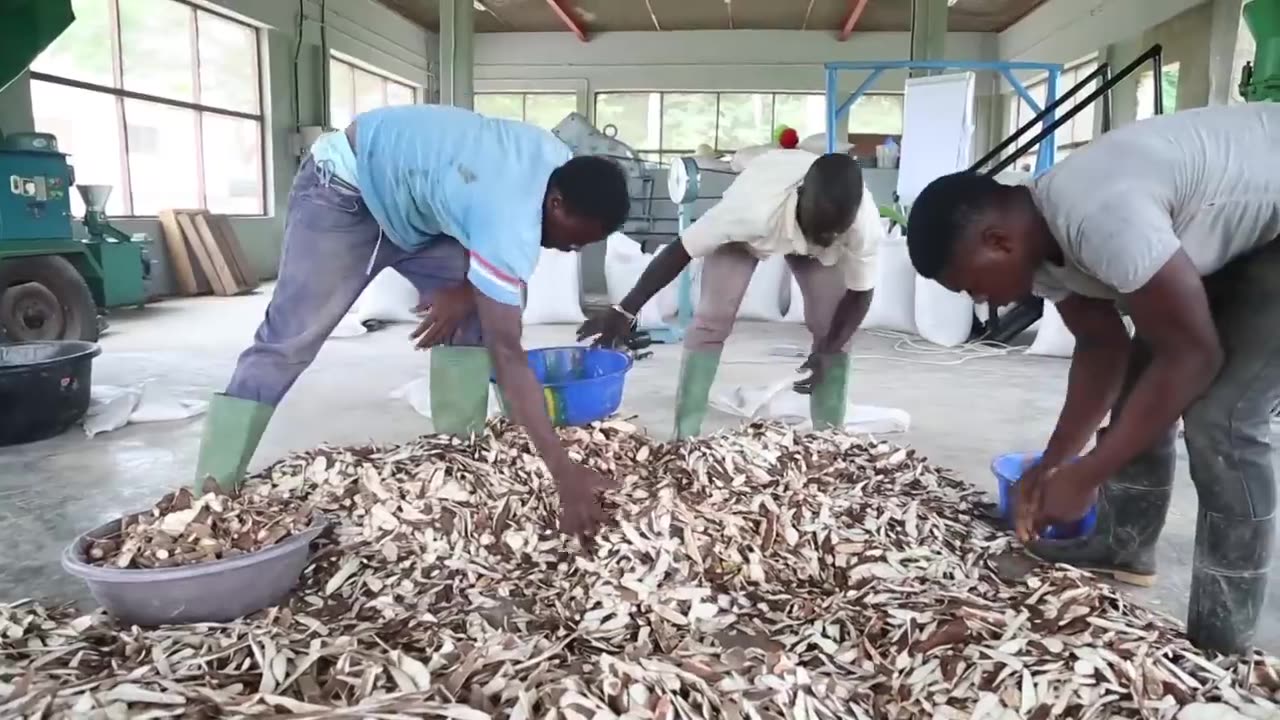Premium Only Content

Transforming cassava peels into animal feed
Transforming cassava peels into animal feed is an innovative and sustainable approach that addresses both environmental and economic challenges. Cassava is a widely cultivated root crop, and its peels are a byproduct generated during processing or consumption. Traditionally, these peels are considered agricultural waste and pose disposal challenges.
However, researchers and farmers have discovered that cassava peels can be transformed into nutritious animal feed, offering a valuable solution for utilizing this resource. The process involves treating and processing the peels to enhance their nutritional value and make them suitable for animal consumption.
The transformation typically includes several steps. First, the peels are thoroughly washed to remove dirt and contaminants. Next, they undergo a drying process to reduce moisture content and enhance their shelf life. This can be achieved through sun drying or using mechanical dryers, depending on the available resources.
After drying, the cassava peels are often milled or ground into smaller particles, making them easier for animals to digest. This step also helps to improve the overall texture of the feed. The resulting product can then be mixed with other ingredients such as grains, vitamins, minerals, and protein sources to create a well-balanced animal feed.
Cassava peels are rich in carbohydrates and fiber, making them particularly suitable for certain livestock animals such as pigs, poultry, and ruminants. The feed derived from cassava peels can provide an affordable and sustainable alternative to conventional feeds, contributing to the reduction of production costs for farmers.
Moreover, the utilization of cassava peels as animal feed has environmental benefits. By converting the peels into a valuable resource, it reduces waste generation and potential environmental pollution that could occur during improper disposal.
Overall, transforming cassava peels into animal feed offers a dual advantage of reducing waste and providing a cost-effective and nutritious feed source for livestock. This sustainable practice can contribute to improved animal nutrition, reduced environmental impact, and increased economic viability for farmers in regions where cassava is cultivated.
-
 4:44:04
4:44:04
Akademiks
8 hours agoDiddy is RUNNING The Jail! Feds Fear He's Unstoppable even behind Bars! Drake Revenge Era?
67.6K5 -
 5:26:52
5:26:52
Fed Reacts
6 hours agoZODIAC KILLER PT 2
43.5K7 -
 2:12:41
2:12:41
TheSaltyCracker
9 hours agoMSM Implodes After Trump Win ReeEEeE Stream 11-17-24
195K399 -
 4:31
4:31
SLS - Street League Skateboarding
10 days agoFuna Nakayama 3rd Place at SLS Sydney 2024 | Best Tricks
61.2K7 -
 2:15:24
2:15:24
vivafrei
18 hours agoEp. 236: BARNES IS BACK! Election Recap! Trump Nominees! Trump Persecutions - Wha's Next? & MORE!
223K222 -
 6:25:47
6:25:47
SynthTrax & DJ Cheezus Livestreams
17 hours agoDJ Cheezus & DEF JAM Fight for NY on PS2 - Hip Hop Violence and Vibes (1pm PST / 4pm EST)
88K4 -
 2:01:47
2:01:47
Nerdrotic
12 hours ago $13.83 earnedEgypt, Peru and Guatemala Luke Caverns RETURNS! | Forbidden Frontier #082
76.8K10 -
 LIVE
LIVE
Vigilant News Network
12 hours agoFDA Approves Trials for New “Pandemic” Vaccine | Media Blackout
2,244 watching -
 4:06:21
4:06:21
GamerGril
13 hours agoIM THE GREASTEST OF ALL TIME AT.... CHAOS | DAYS GONE
117K12 -
 3:00:18
3:00:18
Due Dissidence
1 day agoTHE PEOPLE VS NATURE by Kevin Augustine - plus a talkback w/ Jimmy Dore
136K12